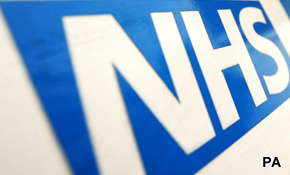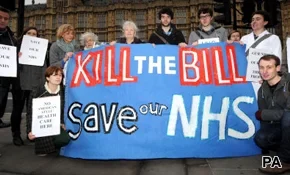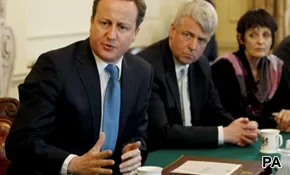In the 14 months since the Health and Social Care Bill was first launched into the political ether, the government’s proposed ‘shake-up’ of the NHS has followed an embattled path... and the debate is far from over.
The Health and Social Care Bill aims primarily to replace Primary Care Trusts (PCTs) with ‘Clinical Commissioning Groups’ – groups of GPs and other healthcare practitioners who will be responsible for shaping local health services in England. These Clinical Commissioning Groups would be given the budgetary power to spend money on services from ‘any willing provider’, including private and voluntary groups, and receive their funding and guidance from an independent National Board.
David Cameron argues that the government is going ahead with its ‘radical’ reforms “because it’s good for patients to have choice, [and] because we think it’s good to have the involvement of independent and voluntary sectors.” But the British Medical Association, the Royal College of Nursing, and members of the Royal College of GPs are among the professional bodies who have called for the Bill to be withdrawn or significantly altered as it may cause health service to shrink and jeopardise standards of care.
But where do Labs participants stand on the matter? Do they back the government, or side with the concerns of the BMA other healthcare professionals?

What do you think of the proposed changes to the NHS? Join the debate by using Disqus below

I Support the Health and Social Care Bill
ARGUMENT 1: Restructuring the NHS will save money

“I don't think the NHS is the answer to this country's health – I think it should be seen as it is: a failing business which needs to adapt to survive.” Anon
“The NHS is running out of control. It was never [Aneurin] Bevan’s intention for the Health service to be economically crippling, but to be an assured 'safety net'” Anon
“Money is wasted in the NHS through budgets, and an extra panel to control these budgets would help spend money where it’s needed” Kai, Letchworth
“The NHS on its own does not have the drive or inclination to seek radical changes – the government needs to push and stimulate such change” John, Teeside
“The taxpayer cannot afford to keep pumping billions into the NHS. We need some private companies to invest but still keep it free at the point of access. The NHS will collapse if things stay as they are, and there are too many managers in made-up jobs” Elaine, Southampton
“I applaud the government's efforts to get a grip on NHS expenditure” MB, London
ARGUMENT 2: Services aren’t up to scratch

“Reform is needed. Patients are not getting the best treatments for them as individuals” Anon
“People have a rose-tinted view of the NHS. In actuality, unless you have a life-threatening illness or injury, it provides poor coverage. Unlike the US where care is based on ability to pay, in the UK care is based on where you live and ability to pay – unlike the US, we have to pay whether we receive the treatment or not” Jim, Norwich
“The medical profession protested at least as vigorously when the NHS was created. The professions do not like change. So long as the patients receive good care at the point of delivery at no cost to them, then what is wrong with choice based on quality of service?” Anon
“The NHS is a bureaucratic nightmare. Increasing options for patients can only be a good thing” Peter, Stokenchurch
“My main support for the bill is in relation to the combination of health and social care – much more medical care should be carried out in the community and we need fewer hospitals” Anon
“Utilising the private sector to ease waiting lists is not privatising the NHS. Giving GPs more say in the process allows for better use of funds. Giving patients more choice in their health care encourages them to be more aware of taking responsibility for their health” Anon
ARGUMENT 3: Doctors should be in charge of budgets
 “Lansley (and Cameron) have ALWAYS put forward their belief that only our GPs and other health specialists can make the correct treatment decisions for their patients – NOT Administrators whether local or national! I agree with them” Tony, Chesterfield
“Lansley (and Cameron) have ALWAYS put forward their belief that only our GPs and other health specialists can make the correct treatment decisions for their patients – NOT Administrators whether local or national! I agree with them” Tony, Chesterfield
“I think a local doctor should be able to get help for his patients as fast as he can without long waiting lists” Chris, Dewsbury
“GPs know more about their patients’ needs than Primary Care Trusts (PCTs) do. PCTs can be very short-sighted – e.g. not allowing diabetics to have test strips, which is laying-in a lot of additional cost for complications in the future. Doctors will hopefully realise that saving money on treatment today will only cost more –in human heartbreak too – in the future” Aileen, Oldham
“Currently the NHS drains money and doctors have hundreds of pointless quotas to fill. By taking these out and giving GPs more autonomy, we can have a better functioning NHS with better, more personal doctor-patient relations, which will lead to better diagnosis and care” Anon
ARGUMENT 4: We need to cut out bureaucratic ‘red-tape’ in the NHS

“I work in a contracted healthcare service. Around us we see endless NHS meetings, 'patient pathways' no one ever looks at, audit for audit’s sake to tick boxes (not for any useful benefit), and departments rushing at the end of the year to spend budgets on anything rather than see a possible budget cut. The worrying thing is all the NHS managers we talk to seem to be setting up as consultants and expect to make more money advising GPs! Change is needed but needs to be right” Concerned Still, Wolverhampton
“The NHS has steadily deteriorated as managers have taken responsibility from clinicians to save money. The NHS management ethos is so far-removed from clinical consideration that I am surprised that no managers have suggested Sickle Cell Disease precautions were racist, as they did with TB. I retired from the NHS when I was criticised for not using the right form to point out that leaving an anaesthetic machine which was known to be defective in theatre for an operating list was dangerous!” Matthew Southport
“If large management structures are reduced or abolished, decision-making should be closer to the points of delivery” Anon
“There is too much red tape, too much administration and not enough power in the hands of doctors and nurses who actually do the work” Dave, Sheffield
ARGUMENT 5: The NHS can't carry on as it is
 “As it stands, the NHS can't continue. Whilst there might have been better ways to go about implementing the reform, the bill is an important sign to the NHS that its monopoly on healthcare needs to end” Anon
“As it stands, the NHS can't continue. Whilst there might have been better ways to go about implementing the reform, the bill is an important sign to the NHS that its monopoly on healthcare needs to end” Anon
“The NHS needs change and politicians have to start somewhere. The NHS is a wonderful service but it is seriously lacking in several areas” Anon
“The NHS is an unwieldy, overly bureaucratic and top-heavy organisation. Since nursing degrees were introduced, nurses have become further removed from the patient, and without matrons, hospital wards have become ‘someone else's responsibility’. The Strategic Health Authority was nothing more than a political vehicle determined to implement the Government's bidding. Primary Care Trusts are hugely top-heavy and target driven. This I may say is from a first-hand perspective” M Trett, Manchester
I am AGAINST the Health and Social Care Bill
ARGUMENT 1: Competition puts emphasis on profit not patients

“I am against privatisation and the creation of a two-tier system where NHS patients are palmed off with cheap, delayed, second-rate treatment while private patients get pampered” David, Norfolk
“They will put healthcare into the hands of profit driven companies, which will ultimately harm patient care – companies care about their profit margin, not people” Anon
“By encouraging Trusts to sell to up to 50% private patients, the Health Service will move towards a private model” Ned, UK
“The current reforms are only the start, and there is already discussion of what will come next on political blogs. I think it's disgusting how this government is moving our country towards the worst aspects of America; even my friends in the USA say how most states over there aren't going as far as the Tories are trying to take us in the UK” Anon
“Private providers will only want to take on patients' treatments in cases of ‘one-off' procedures. No group will want to undertake the care of patients with long term, chronic or complicated conditions requiring multiple expertise and high quality co-ordination. I have long term mental health and chronic pain problems. My husband has type 1 diabetes. We will be left as the dregs in a fragmented system” Frances, Hertfordshire
“I don’t think the NHS will be improved by making bits of it privatised profit-making. If these profitable bits work well, they should be subsidising other parts of the NHS which will never be profitable in a business sense. This is a service for all, not profit for a few which will make the remainder more expensive for the taxpayer” Anon, Milton Keynes
ARGUMENT 2: Healthcare professionals are against Lansley’s Health Bill

“Almost invariably, the people who work in the NHS reject the proposals, as front line workers know a poorer service will be provided, and as pre-2007, people will die on waiting lists” Anon
“Unnecessary; unfair; unwanted by the professionals” Chris, UK
“I can understand the government's desire to cut back on spending, but at least listen to the views of those who work within the NHS” Valerie, Sutton Coalfield
“I personally do not understand in detail enough of the changes, but if various organisations of medical professions (e.g. Royal College of Nursing etc.) state that they have reservations then it is likely that there is something wrong with the Government's Health Bill” M Jarvis, Maidstone
“I am employed in the health service and strongly believe that the government is trying to allow the private sector to influence the NHS. This is through drug companies and now service providers. As a professional, I am meant to show no breach of impartiality. However the government seems to allowing up the possibility of giving away NHS services to private companies; while insisting on using the terms ‘holistic’ and ‘client-centred process’” P, Belfast
ARGUMENT 3: Changes will increase inefficiency
 “Doctors are not managers. If they are made into managers they will fail and will bring in business to do what they can't. Eventually private companies will end up in charge, equalling the end of the NHS” Jack, London
“Doctors are not managers. If they are made into managers they will fail and will bring in business to do what they can't. Eventually private companies will end up in charge, equalling the end of the NHS” Jack, London
“Doctors should concentrate on medical matters, not administration and management” John, Leeds
“Evaluating different providers, increased paperwork and general time-wasting will mean less time and money spent on actual patients. It’s not needed and doctors are qualified to treat patients, not to balance accounts!” SP, Gloucestershire
“GP funding cannot work effectively – the probability that decisions will be based more upon budget management than need is too great, and so-called patient 'choice' can skew strategic planning, turning health care into a postcode lottery. It’s poorly thought through, and potentially catastrophic” Anon
“They are handing too much power to GPs, and making it harder for patients to access care” Jacki, Guildford
ARGUMENT 4: Cameron is U-turning on his promise

“I am against, because in a time of austerity when money is scarce, it is not appropriate to spend money to reap the rewards, if any, when we will be out of recession.
We should be focused on keeping costs down, not implementing top-down change” Graham, Lauder
“The government has no mandate to make these changes. They were not elected on this platform” Vicky G, Bridgend
“I judge by my own experience. David Cameron promised to protect the NHS and in my view he is giving it away. Our local hospital, Queens, has the 'deserved' title of worst in the UK, with several unnecessary deaths in Maternity, and the A&E unable to cope. Despite this, Lansley and Cameron have sanctioned the closure of the Maternity Department and the A&E in the neighbouring hospital, King George. This is outrageous. Clearly the Tories can't be trusted with our NHS. They are not listening to the majority of professionals who oppose their plans. They 'listen' and then ignore” Patricia, Greater London
“In Cameron’s manifesto he PROMISED the NHS would be safe in his hands,but he is now going to privatise it through the back door”
Neil, Barnsley
ARGUMENT 5 - It's change for change's sake

“The NHS reforms are being rushed through in a year, whereas Project Merlin, the much more desperately needed reform of the banks, is to take eight years, so as to make sure the implementation is measured and viable. Why do the banks deserve such consideration, and the average citizen does not?” Paul, York
“The NHS is a public service that everyone uses throughout their lives and it needs stability not uncertainty or constant changes. Leave it be” JA, Northeast London
“The NHS is underfunded and this is just tinkering. How long before doctors start complaining that they have too much paperwork dealing with funding? My partner is a nurse, and as per usual, psychiatric services are underfunded and underrepresented. Moving the deckchairs around on the Titanic will solve nothing” Lesley, Bridgend
“I am opposed because these reforms are not for the benefit of the NHS or the people it serves, but instead are ideologically driven by this Conservative government” Jordan P, Worcester
“It’s far too complicated. There are over a thousand proposals; too many people would be required just to regulate and implement the changes” JB, Glasgow
How well informed are people about the Bill?
Some have a “very good understanding” due to:
 Reading the Bill, or summaries of – “Obviously the best source”
Reading the Bill, or summaries of – “Obviously the best source”
Using several different sources for information – “…Parliamentary debates, online blogs, speaking to employees of the NHS, reading newspapers, watching debates and political programs on television…”
Asking GPs, nurses, other health care profesisonals for their take – “I asked for my GP’s opinion”
Asking friends and family members who work in the NHS – “I hear from relatives and friends from inside the NHS when union or management discuss what is likely to happen or what they've been prepared to accept”
Professional publications and documents – “The best sources are King's Fund, press, the Health Service Journal, online comment, reports produced by health bodies”
People whose understanding was “not very good” put it down to:
 A lack of clear info – “The government has not been very clear on what the proposals will actually achieve in relation to patient care and the long term future of local hospitals
A lack of clear info – “The government has not been very clear on what the proposals will actually achieve in relation to patient care and the long term future of local hospitals
“There should be a 'plain English' and common sense version for the electorate to read”
A lack of interest – “I don’t have much of an interest in Healthcare as part of Government policy”
Over complexity–“It is rather complicated with lots of strands, and I am not up to date with it all. But I know I could find out more detail if I wanted to”
It’s hard to keep up with – “The changes to the NHS and Social Care Bill are numerous and the speed at which the Bill is changing means that nobody understands what’s happening”
The negative side of the debate has taken over – “Everything seems to be concentrated on the negative aspects of the arguments and shouting abuse in the Commons rather than sensible explanations of what is at stake and why medics oppose it in such large numbers”

What do you think of the proposed changes to the NHS? Enter Disqus below to add your voice to this debate







